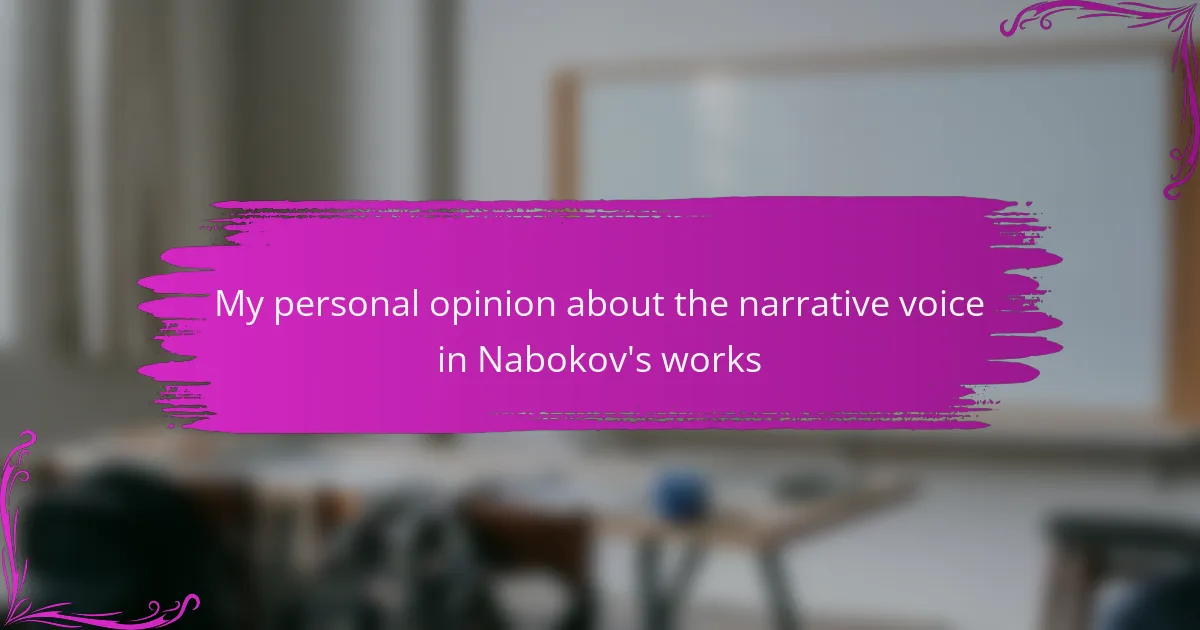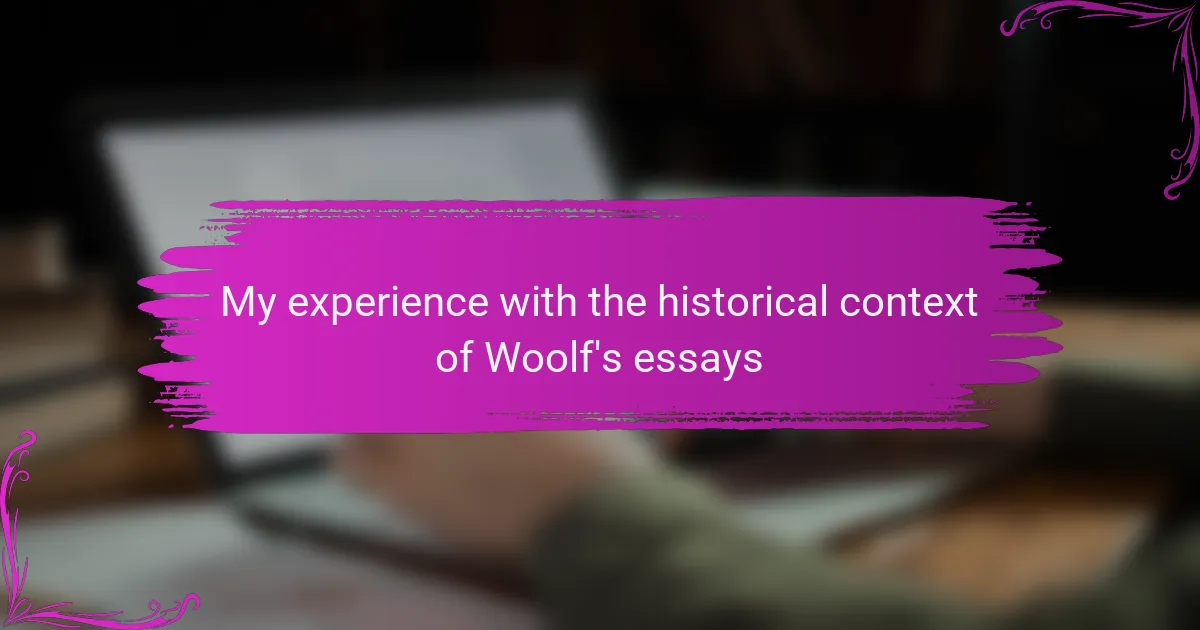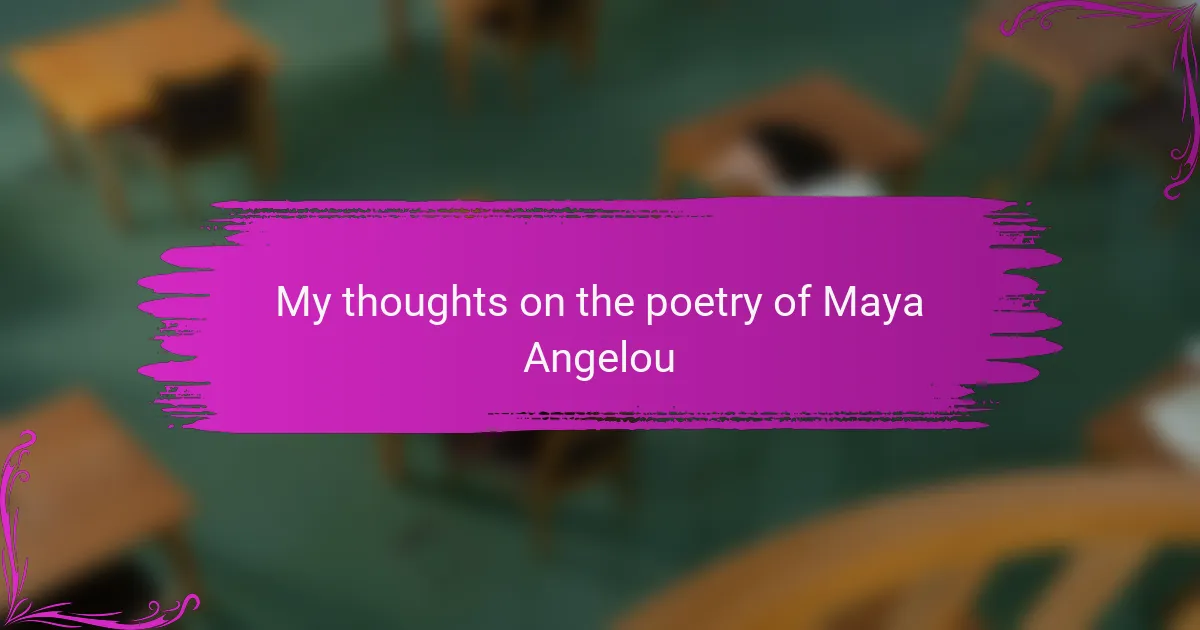Key takeaways
- Narrative voice significantly shapes reader engagement and emotional connection, influencing how events and characters are perceived.
- Nabokov’s literary style is marked by playful language and complex narration, inviting readers to reflect on memory and perception.
- His unique use of irony and lyrical prose creates a blend of beauty and discomfort that leaves a lasting impact on readers.
- Nabokov’s works encourage active interpretation, prompting readers to examine their own reactions and understandings of the narrative.
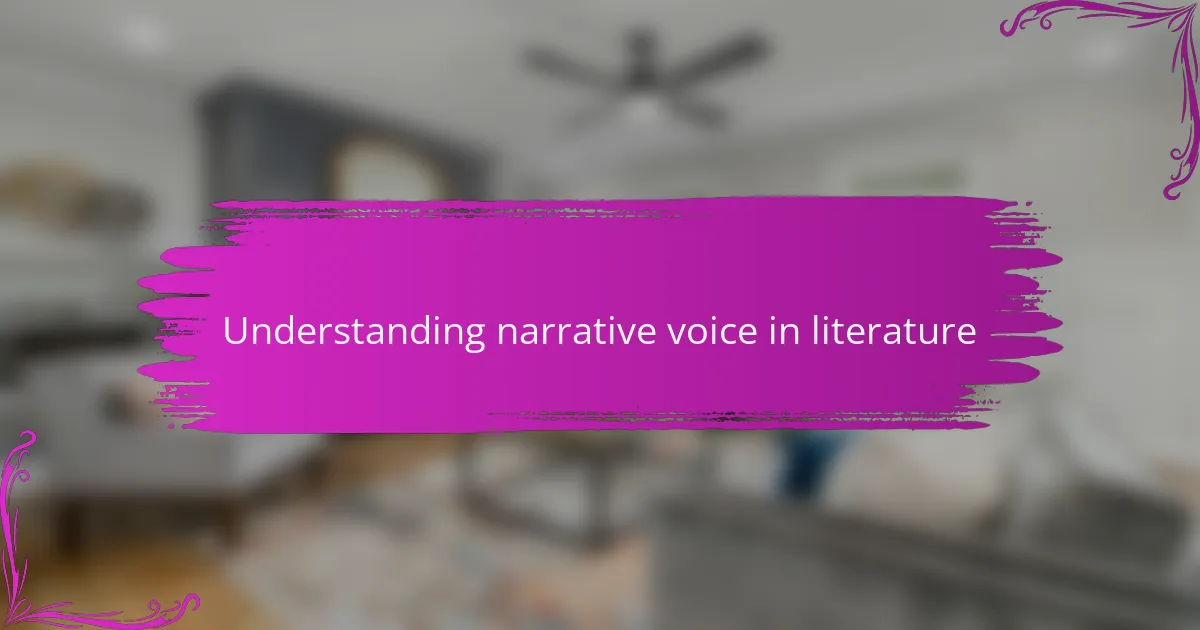
Understanding narrative voice in literature
Understanding narrative voice in literature involves grasping how an author conveys their story through the perspective of their characters. I find that the narrative voice can profoundly influence our connection to the narrative itself. For instance, some voices feel intimate and confiding, while others offer a more detached observation, shaping our emotions and interpretations as readers.
In the context of Nabokov’s works, his unique manipulation of narrative voice adds layers of complexity. When I dive into his novels, I often feel like I’m guided by a narrator who is not just recounting events but actively playing with language, inviting me into a dance of wit and reflection. This distinctive approach not only enhances the plot but also mirrors the intricacies of human experience and memory.
Here’s a comparison of different narrative voices often found in literature:
| Narrative Voice | Description |
|---|---|
| First Person | A personal narration that allows deep insights into the narrator’s thoughts and feelings. |
| Third Person Limited | A narrator tells the story from the perspective of one character, providing some intimacy with that character’s experiences. |
| Third Person Omniscient | A narrator that knows everything about all characters, providing a broad view but often less emotional connection. |
| Unreliable Narrator | A narrator whose credibility is compromised, creating tension and intrigue as the reader questions the truth. |
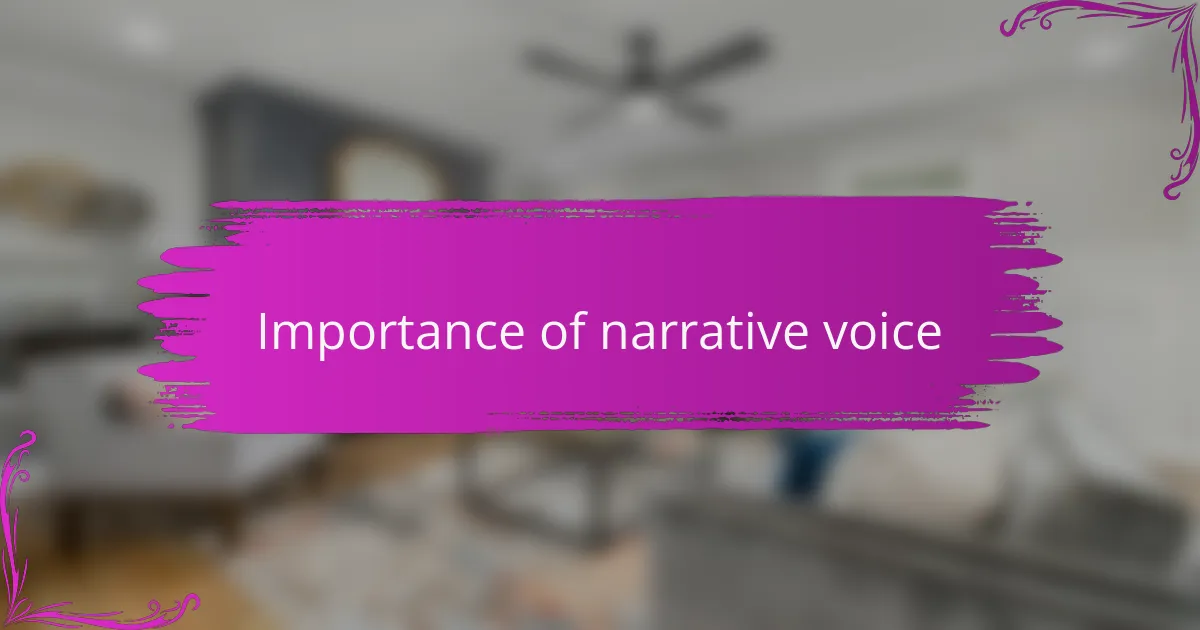
Importance of narrative voice
The narrative voice serves as a crucial bridge between the reader and the story, transforming mere words into a vivid experience. I often find that a strong narrative voice can evoke emotions, guiding me to see the world through the character’s eyes. Isn’t it fascinating how a single voice can shift my perception of events and characters, making me empathize deeply or even feel distant?
In my reading journey, I’ve noticed that Nabokov’s use of narrative voice is particularly striking. His narrators often mix humor with profound observations, leaving me both amused and contemplative. When I reflect on his style, I realize that it invites me to savor every word, almost like indulging in a fine meal, where each bite reveals unexpected flavors.
Moreover, narrative voice shapes the understanding of themes and motifs within a work. It’s intriguing to think about how Nabokov’s choice of perspective can challenge or align with a reader’s own experiences. This kind of reflection not only deepens my engagement but also enriches my overall literary experience, encouraging a dialogue between the text and my own thoughts.
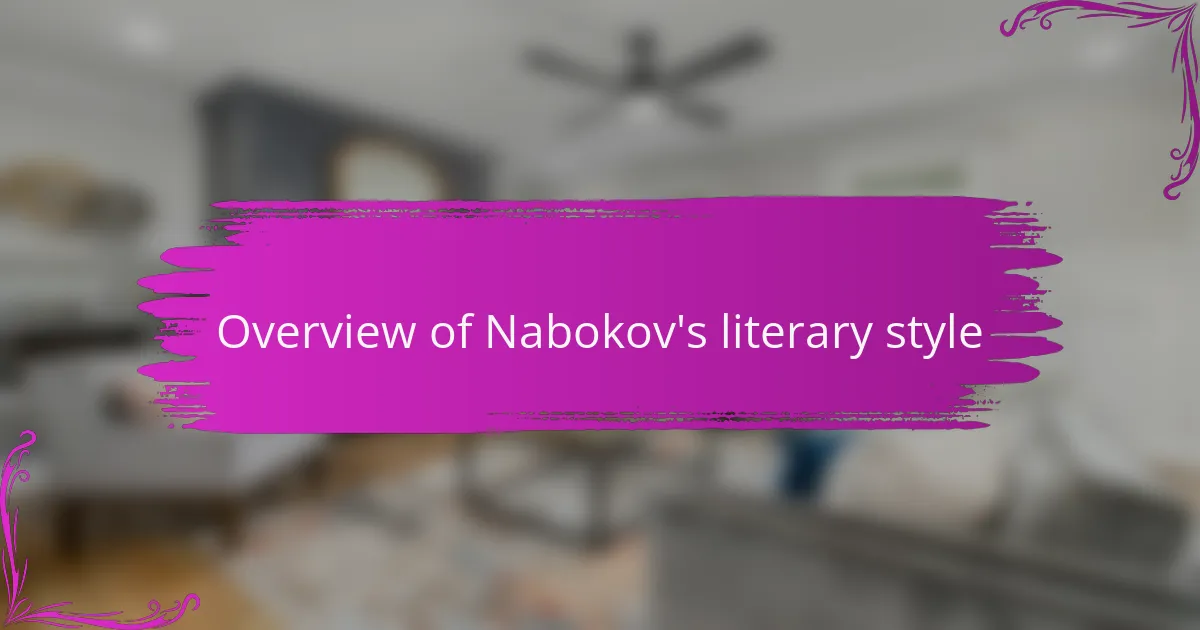
Overview of Nabokov’s literary style
Nabokov’s literary style is both intricate and playful, often marked by his fluid prose. I remember the first time I encountered his writing; it felt like stepping into a beautifully woven tapestry of words. Each sentence seemed to beckon me closer, where even the descriptions held a certain poetry that lingered in my mind long after I turned the page.
One of the striking elements of Nabokov’s works is his deft use of language. He doesn’t just tell a story; he elevates it with a rich vocabulary that challenges and delights me as a reader. For instance, I often find myself pausing to savor a particularly vivid description or an unexpected turn of phrase. It’s a reminder of how language can be an art form in its own right, evoking the sights and sounds of the world he creates.
Additionally, Nabokov’s narrative style often blurs the line between reality and fiction. There are times when I’ve questioned the reliability of his narrators, leaving me both intrigued and uncertain about what to believe. This unstable footing adds an exciting layer of complexity to his storytelling, inviting me to reflect on my own perceptions and biases as I make sense of the narrative unfolding before me. Isn’t it fascinating how our understanding can shift with each turn of the page?
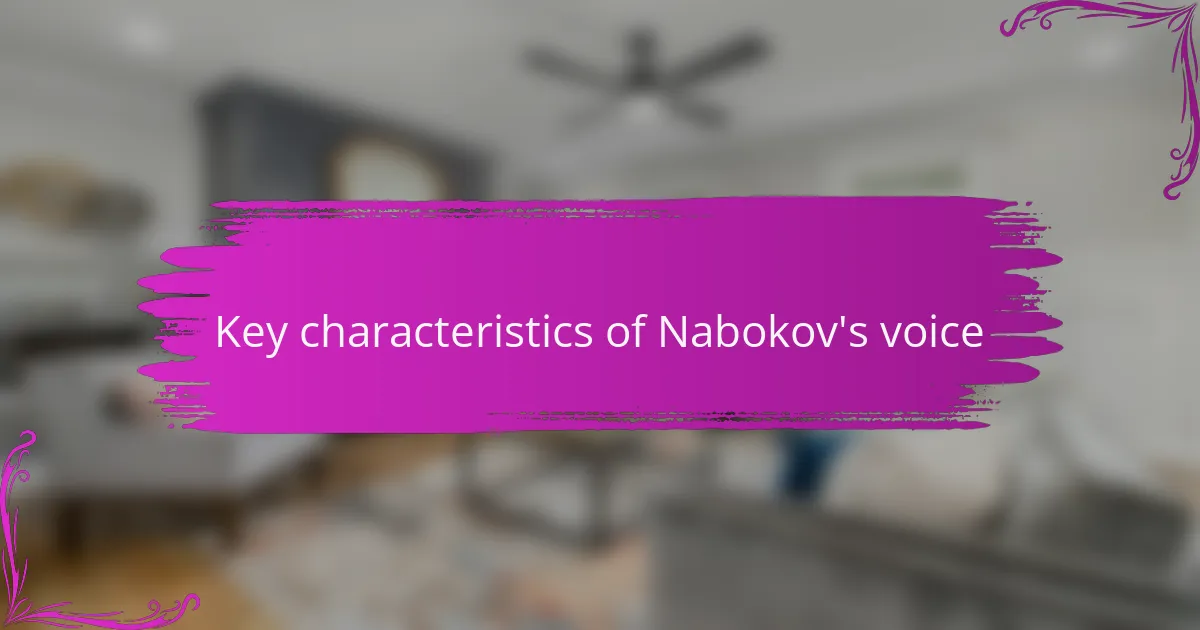
Key characteristics of Nabokov’s voice
Nabokov’s narrative voice is strikingly distinctive, characterized by its playful yet precise language. I often find myself captivated by his clever wordplay and rich imagery. His ability to weave complex emotional layers into seemingly simple scenes pulls me into the characters’ psyches, making every line feel like an intimate revelation.
Another key characteristic is his relentless exploration of memory and perception. Nabokov’s prose often feels like an intricate puzzle, compelling me to piece together the narrative while questioning the reliability of the narrator. This adds a layer of depth to my reading experience that I truly cherish.
His unique blend of irony and sincerity often leaves me both amused and contemplative, prompting me to reflect on the nuances of human experience. It’s this very quality that keeps me revisiting his works time and again.
| Characteristic | Description |
|---|---|
| Playful Language | Clever wordplay and vivid imagery engage readers and ignite emotions. |
| Complex Narration | Exploration of memory and perception creates depth and challenges reliability. |
| Irony and Sincerity | A blend that elicits humor and deep reflection on the human experience. |
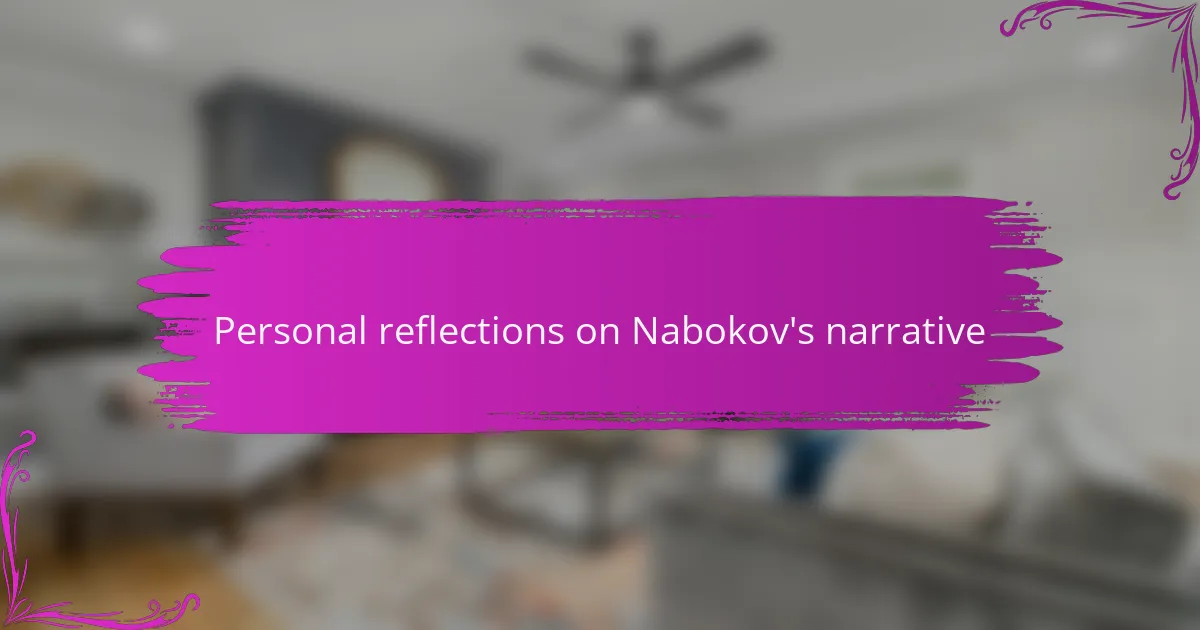
Personal reflections on Nabokov’s narrative
When I delve into Nabokov’s narrative voice, I often find myself captivated by its richness and playfulness. I remember reading “Lolita” for the first time, and how Humbert Humbert’s voice felt almost hypnotic—drawing me into a complex web of morality and obsession. It’s this dance between beauty and darkness that keeps me coming back to Nabokov’s works, where even the most unsettling themes are presented with a lyrical elegance.
Another piece that stands out is “Pale Fire.” The layered narrators and the intertwining of commentary and poetry fascinated me; it made me reflect on how much our interpretation shapes what we read. This narrative complexity is something I cherish, as it prompts me to question the reliability of the characters and to inspect the deeper meanings behind their voices.
I realize that Nabokov’s narrative invites readers to become detectives of their own understanding. His playful manipulation of language creates a unique experience, allowing me to explore not just the story, but also my reactions to it. Each reading feels like uncovering new layers, making the experience substantially richer.
| Aspect | Nabokov’s Works |
|---|---|
| Narrative Style | Rich, poetic, and often unreliable |
| Main Themes | Beauty, morality, obsession |
| Reader Engagement | Encourages active interpretation and reflection |
| Emotional Impact | Fascination mixed with discomfort |
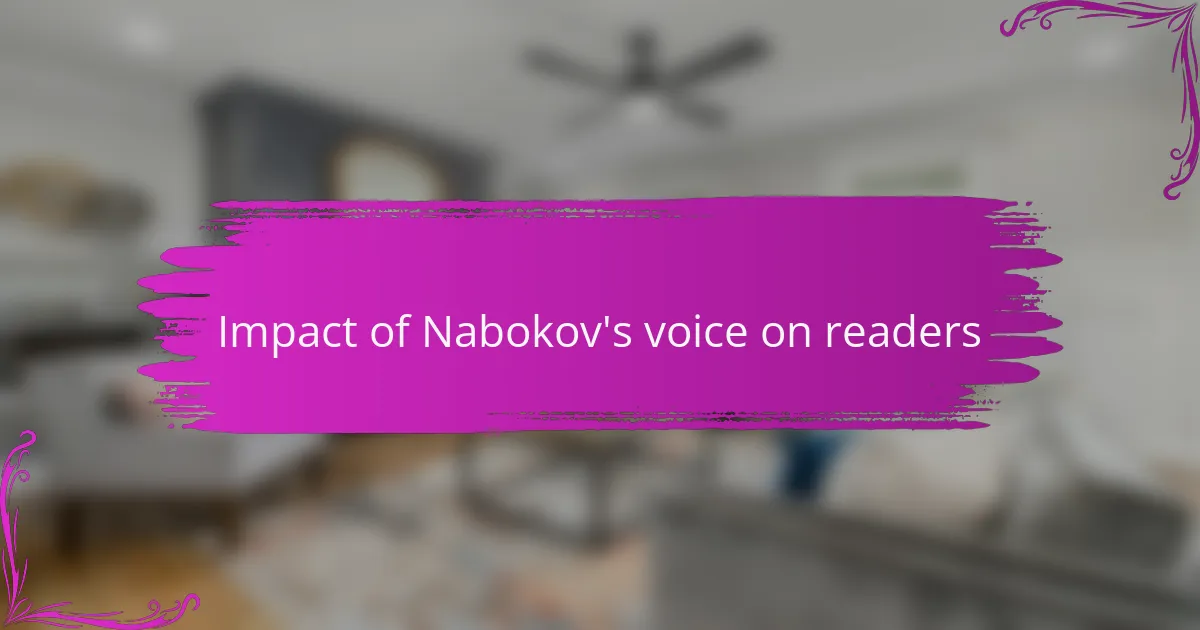
Impact of Nabokov’s voice on readers
Nabokov’s narrative voice is a unique lens through which readers experience his stories. I remember the first time I read “Lolita”; Nabokov’s lyrical prose had me entranced, even while grappling with morally complex themes. His ability to blend beauty with discomfort creates a lasting impact, making readers reflect on their own perceptions and judgments.
What strikes me most is how his voice can shift from playful to tragic in an instant, pulling us into a deep emotional response. For instance, in “Pale Fire,” the layers of commentary enrich the text, leaving readers questioning their interpretations. This multilayered approach challenges us to engage actively with the narrative, transforming passive reading into an immersive experience.
Here’s a comparison of Nabokov’s voice with other authors’:
| Author | Narrative Voice |
|---|---|
| Nabokov | Lyrical, complex, often contradictory; evokes deep emotional responses. |
| Hemingway | Straightforward, terse; focuses on action and outcome rather than emotional depth. |
| Toni Morrison | Rich, poetic; explores themes of identity and heritage with emotional depth and nuance. |
